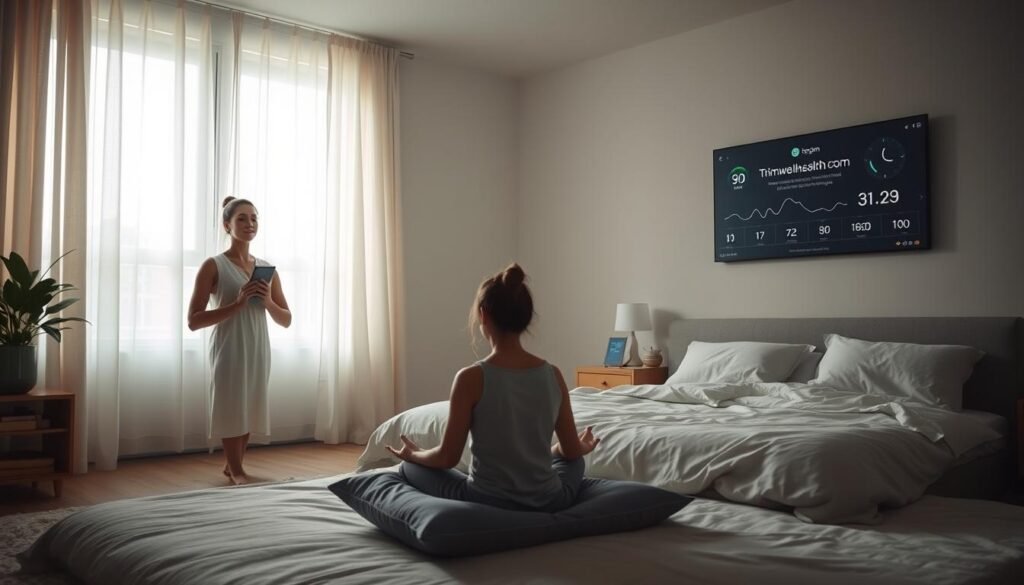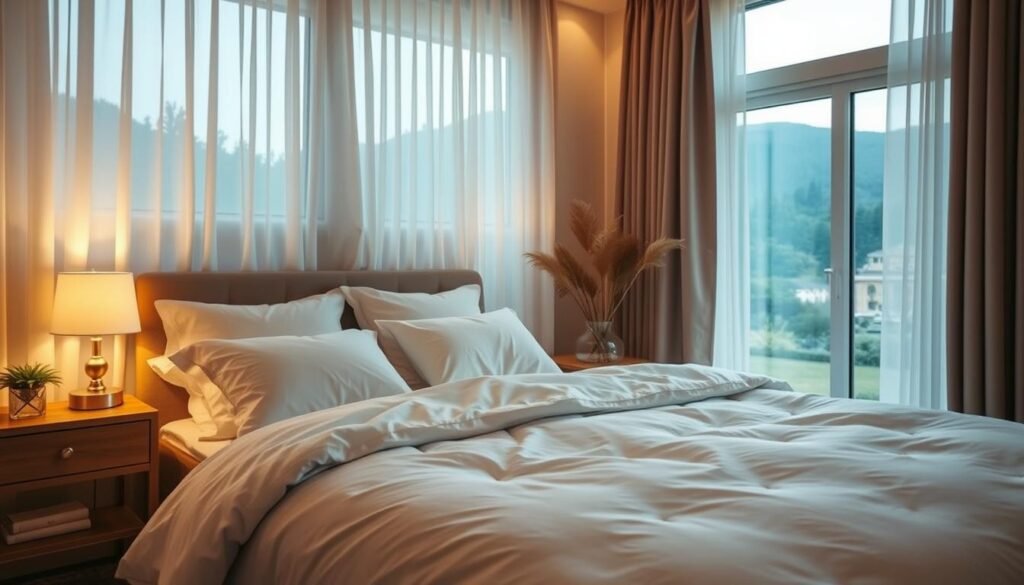Sleep Syncing: Boost Energy With New Techniques
Have you ever wondered why sleeping in on weekends makes you tired during the week? This question leads to sleep syncing. It’s a way to match your sleep with your body’s clock, the circadian rhythm.
In today’s world, we often don’t sleep well. This can hurt our health and energy. Let’s dive into how sleep syncing can change your day.
Key Takeaways
- Sleep syncing helps train your body for restorative sleep.
- Consistent sleep patterns can materially improve sleep quality.
- Aligning sleep with your circadian rhythm can boost overall well-being.
- Improved energy levels can lead to enhanced productivity.
- Health impacts of irregular sleep cycles highlight the need for sleep optimization.
What Is Sleep Syncing?
Sleep syncing means matching your sleep with your body’s natural clock. This clock, or circadian rhythm, controls when you sleep and wake. It also affects hormone levels and digestion.
When you sleep at the right time, you feel more awake and healthy. This is because your body is in sync with the day-night cycle. Sleeping well helps you have more energy and feel better overall.
Not sleeping when your body wants to can mess up your body’s functions. This can make you feel tired, confused, and sick. It’s important to sleep at the same time every day to keep your body healthy.
Many people don’t realize how important their internal clock is. Learning about sleep syncing can make you sleep better and feel more alert during the day. For more on how light affects your mood, read this guide on blue light and anxiety.
How Does Our Body Clock Work?
The body clock controls our daily life through a system called circadian rhythms. It runs on a 24-hour cycle. This cycle matches our sleep and wake times with light and dark.
At the center of this system is the master clock. It’s a group of brain cells in the suprachiasmatic nucleus. This master clock helps control our body’s activities, like hormone release and metabolism.
Morning sunlight wakes us up. It tells our body clock to be alert. When it gets dark, our body starts to get ready for sleep. This helps us feel tired at night.
Things like artificial light at night and irregular sleep can mess with our body clock. This can lead to health problems, like poor sleep and feeling unwell.
Knowing how our body clock works helps us stay healthy. By following natural circadian rhythms, we can feel more energetic and productive. For tips on better daily routines, check out this resource.
The Importance of Circadian Rhythm in Sleep Quality
The circadian rhythm is key to good sleep and health. It controls our body’s clock, including when we feel sleepy. A good rhythm means better sleep, helping us feel refreshed.
But, if our rhythm is off, sleep suffers. This can cause insomnia and mood changes. It might even lead to anxiety or depression. Staying in sync with day and night helps avoid these problems.
Keeping a regular sleep schedule helps our internal clock. This leads to better sleep and a healthier life. Knowing how important the circadian rhythm is helps us improve our well-being.
Benefits of Sleep Syncing: Improve Your Energy Levels
Sleep syncing has many benefits that can make your life better. People who do this say they feel more energetic, happier, and smarter. It helps them sleep better, which is key for staying healthy.
Studies show that regular sleep times help avoid sleep issues like insomnia. This leads to more energy and better mood during the day. It also helps you feel less hungry and more focused.
Trying sleep syncing can make you perform better every day. It also helps your health in the long run. By syncing with your body’s natural rhythms, you can feel more alive and happy. Learn more about sleep syncing online, like in this article.
| Benefits | Impact on Energy Levels | Effects on Productivity |
|---|---|---|
| Improved Mood | Higher energy throughout the day | Enhanced focus and efficiency |
| Deeper Restorative Sleep | Increased alertness | Better decision making |
| Reduced Sleep-Related Problems | Lower daytime fatigue | Increased output |
Sleep Syncing: A New Way to Boost Energy
Knowing about sleep patterns is key to feeling more energetic. Matching your sleep time with your body’s natural rhythm helps a lot. This way, you can sleep better and be more productive during the day.
Understanding Sleep Patterns
Sleep patterns show how long and well you sleep. Keeping track of these patterns helps you find the best times to rest. This lets you sync with your body’s clock better. With regular sleep, you can do better in your daily life.
Link to Improvement in Productivity
Trying sleep syncing can really help you feel more awake and productive. Good sleep helps you remember things and think clearer. This means you can do better in your work and daily tasks.
Techniques to Implement Sleep Syncing
Learning how to sleep sync is key for good nights. It helps you sleep better by setting a regular sleep time. It also makes your bedtime routine calm and relaxing.
Establishing a Consistent Sleep Schedule
Keeping a regular sleep schedule is important. Try to go to bed and wake up at the same time every day. This helps your body get into a rhythm.
To start, change your sleep time a little each day. You can go 15 to 30 minutes earlier or later.
Creating a Wind-down Routine
A calm bedtime routine tells your body it’s time to sleep. Do things like reading, stretching, or meditation before bed. This gets your mind ready and lowers stress.
Make sure to turn off all screens. They can mess up your calm time. For more tips, check out this link.

Challenges to Sleep Syncing
Trying to sync sleep can be tough. Many find it hard to keep a regular sleep schedule. This is often because of work or travel.
Working odd hours can mess up sleep. People who work at night or early morning find it hard to sleep right. Travelers also face jet lag, making it hard to sleep well.
Some people have conditions like Delayed Sleep Phase Syndrome (DSPS) or Advanced Sleep Phase Syndrome (ASPS). These make it hard to sleep at the right time. They can also cause insomnia.
Stress and anxiety can also mess with sleep. It’s important to know what you need to sleep well. Changing your lifestyle can help tackle these sleep syncing challenges.
How to Optimize Your Sleep Environment
Creating a great sleep space is key for better sleep. A cozy bedroom helps you rest well. Make sure your room is cool, around 60 to 67 degrees Fahrenheit. This makes you feel relaxed and comfy.
Also, keep your room dark. This helps you sleep better. You can use blackout curtains to block out light.
A comfy mattress is also important. It should support your body right. If you hear too much noise, try using white noise machines or fans. They make a calm sound that helps you sleep.
Don’t look at screens before bed. The blue light they give off can mess with your sleep. Have a bedtime routine that doesn’t include screens. This keeps your sleep area calm and peaceful.
| Aspect | Recommendations |
|---|---|
| Temperature | 60 – 67°F for optimal comfort |
| Light Control | Use blackout curtains to block external light |
| Noise Management | Utilize white noise machines or fans |
| Device Usage | Avoid screens 1-2 hours before bedtime |
| Bedding Comfort | Select a mattress that fits personal comfort needs |

Natural Sleep Remedies for Better Sleep
Natural sleep remedies help you sleep better. Mindfulness makes it easier to relax and sleep. Essential oils, like lavender, make your room calm for sleep.
Herbal supplements like valerian root help too. Drinking chamomile tea before bed also works. These natural things make your body feel calm and ready for sleep.
Having a bedtime routine is key. It can include deep breathing or stretching. Being active during the day also helps. All these things together make you feel relaxed and sleep better.
Conclusion
Sleep syncing helps you sleep better by matching your sleep with your body’s natural rhythm. This can make you feel more energetic and healthy. It might be hard to keep a regular sleep schedule, but the benefits are worth it.
Creating a good sleep space and using natural sleep helpers are key. These steps help you start sleep syncing well.
Using these methods can make your sleep better and help you be more productive. Your mood and thinking will likely get better too. Sleep syncing can make your life healthier, helping you wake up feeling great.
FAQ
What are the benefits of sleep syncing?
Sleep syncing makes your sleep patterns match your body’s natural rhythm. This leads to more energy, a better mood, and sharper thinking. It also lowers the chance of sleep problems like insomnia and feeling tired during the day.
By improving sleep, people feel more refreshed and happy overall.
How can I synchronize my sleep patterns?
To sync your sleep, go to bed and wake up at the same time every day. Start by changing your schedule a little bit at a time. Also, have a calm routine before bed to help you sleep better.
What role does the circadian rhythm play in sleep quality?
Your circadian rhythm is like an internal clock that controls when you sleep and wake. It also affects hormone release and how your body uses energy. When it’s in sync, you make more melatonin for better sleep. But, if it’s off, you might feel tired and have trouble thinking clearly.
What challenges might I face when trying to implement sleep syncing?
You might find it hard to sync your sleep due to work hours, light from screens, or sleep disorders. Stress and lifestyle choices can also make it tough to stick to a sleep schedule. You might need to find ways that work just for you.
How can I create an optimal sleep environment?
For the best sleep, your bedroom should be cool, dark, and quiet. Use curtains to block out light and a good mattress. White noise machines can also help.
Try to avoid artificial light and keep devices out of your bedroom.
Are there natural remedies that support sleep syncing?
Yes, there are natural ways to improve sleep. Herbal supplements like valerian root or chamomile tea can help. Mindfulness and essential oils like lavender can also make sleep better.
Having a calming bedtime routine signals your body to get ready for sleep.


